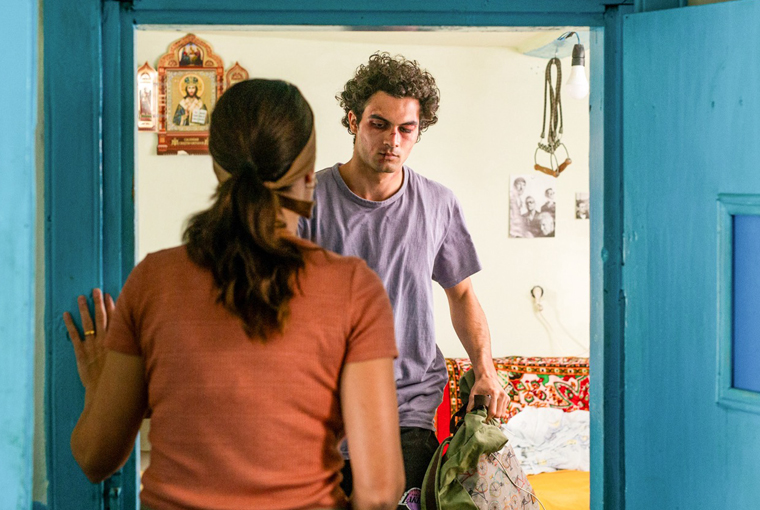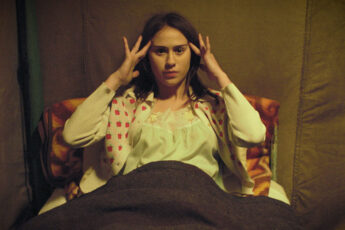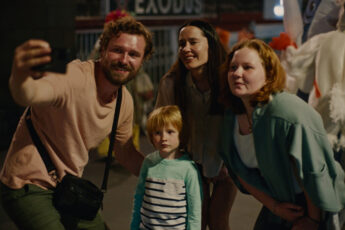“You Can Believe Whatever You Want, But You Can’t Do Whatever You Want.”
Emanuel Pârvu’s Three Kilometers to the End of the World (Trei kilometri pânâ la capâtul lumii, 2024)
Vol. 145 (May 2024) by Jack Page
The humble life of a close-knit Romanian family is upended when their son becomes a victim of a hate crime and the village turns its back on him. The community’s refusal and rejection of a gay identity also exposes the inherent corruption in the village. From tax evasion, bribery, illegal loans, police brutality, and the questionable motives of the church, there isn’t an institution untouched by immorality in the setting of the Danube Delta. Three Kilometers to the End of the World suggests that denying the truth of one individual can lead to the downfall of an entire conservative community.
Hidden in the backstreets of suburbia, away from the public eye of the locals, young adult Adi (Ciprian Chiujdea) and his romantic interest stroll along the dirt roads, fenced in by the mesh borders that line the sidewalk. Under the golden hue of the overhanging streetlamps, they flirt, dreaming of escaping the small-town restraints of their upbringing and eloping to Bucharest to live together. Adi’s boyfriend (Vlad Crudu) promises to support him financially if it will expedite their move. It is a very short, introductory scene that encapsulates the auspicious promises of young love and an intimate moment that is jarringly interrupted. Early next morning, Adi sneaks back into his family home, avoiding the gaze of his parents. His embarrassment does not stem from his exploits from the night before, but from what is quickly revealed to be a bloody and bruised torso under his shirt. Addressing his unease, his mother (Laura Vasiliu) tends to his wounds, soaking his cuts with a warm cloth. Oblivious, his father (Bogdan Dumitrache) looks on in astonishment and anger, assuming his son has been attacked by a gang that have stolen his mobile phone. Determined to bring justice to those responsible, Adi’s father marches his sheepish son to the police station, where he refuses to give any official statement or complaint lest it reveal his homosexuality. As doctors examine his lesions and scars, the guilty-looking Adi continues to omit his boyfriend’s presence during the assault as the police try to piece an investigation together.
The reality of Adi’s situation is soon explained as the entire village enables such ignorance. Every citizen seems to turn their head away from wrongdoings, content to remain close-minded as part of a rural majority. As we follow the investigation from the point of view of the police and Adi’s father, it unfolds the local gangster’s two sons have assaulted Adi and his partner. The police refuse to press charges due to the gravitas the boss has in the town. Moreover, they convince Adi’s father to drop the case should it expose his son’s unaccepted sexual preference within the community, likely leading to the family being outcast entirely. Adi’s father also has debts owed to the mafia and his incomprehension of his son’s sexuality leads him to seek the council of his local church.
In the film’s most shocking sequence, Adi is bound and gagged in the middle of the night by his parents and dragged into another household, where a priest (Adrian Titieni) performs an exorcism on the young man. Adi’s hysterical mother and ashamed father look on as the priest aims to rid Adi of his “illness” through incantations, incense and prayer. Adi’s snotty, muffled cries are even more harrowing when paired with the calm, collected dictation of the priest’s sermon and the ringing of bells.
This desperate action is further complicated with the arrival of a hardheaded social worker (Alina Berzunteanu). She immediately sees through the noncompliance of the police and witnesses, urging Adi to press charges against his assailants and parents. Rather than reveal his homosexuality or punish those who did him harm, Adi himself continues to lie and withhold information. Forsaken by his family and the governmental systems aimed to protect him, Adi has no choice but to flee the village in the hope of a better life in the cultural capital of Bucharest. Through his swift departure, he rids himself of the social and religious shackles that bound him. Free from the constraints of devout Catholicism, his boring, domestic homelife, and a community that villainizes homosexuality, Adi’s escape carries with it a welcome and well-deserved feeling of pathos as he disappears into the maze of riverbanks by stealing his father’s boat.
Unlike the police, his father, and the mafia, Adi cannot be bargained with. Although his unsustainable sheltered existence in the village is brought to a halt too soon, his attack is the catalyst that exposes the institutional corruption within the community. The investigation that follows is a failure for all parties involved, as the old-school traditions and belief systems the repressed village people once upheld are revealed to be insufficient for today’s ethical code. Their prejudice is ultimately self-harming and – without criminal justice being served – everyone is culpable, and everyone is punished. Three Kilometers to the End of the World is a sobering tale of tragic proportions, brought to life by meditative, static long takes and realistic, anchored performances from the entire cast.



Leave a Comment